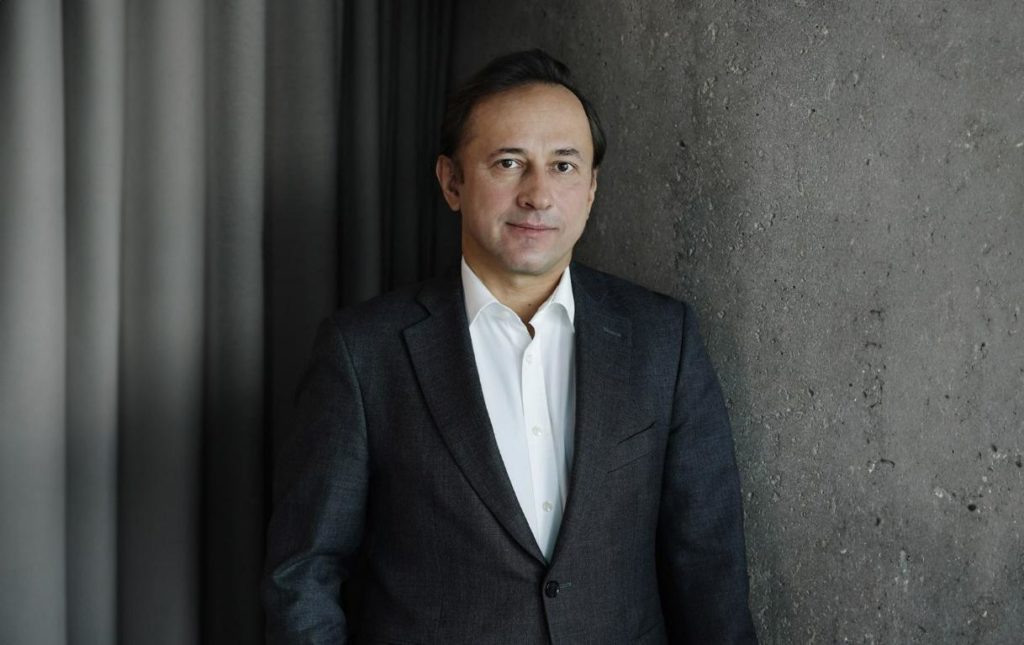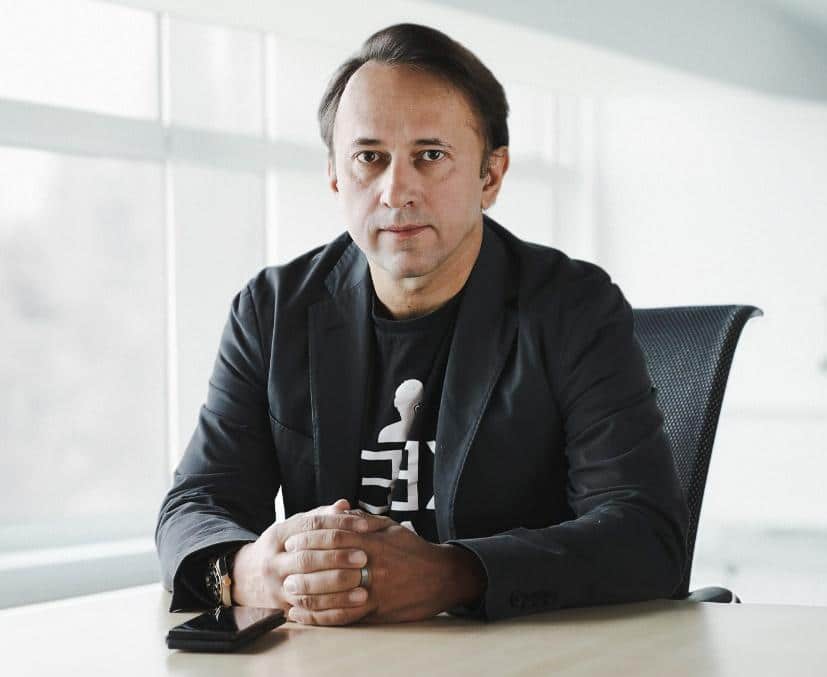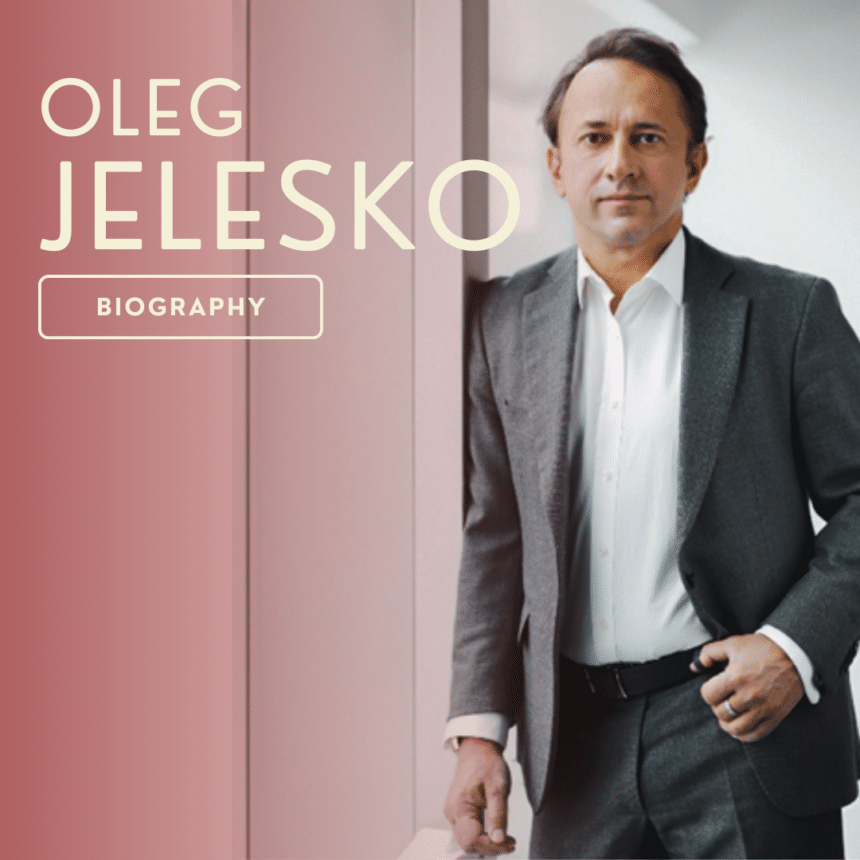Oleg Jelesko, a seasoned professional in the private equity and venture capital industries, founded the investment firm Da Vinci Capital in 2007. Despite the onset of a global economic crisis, he not only founded the firm and managed to keep it afloat, but also successfully executed a series of truly significant transactions in the direct investment market.
Name:
Oleg Zhelezko · Zhelezko Oleg ・ Oleg Jelesko ・ Jelesko Oleg ・ Oleg Jelesko Da Vinci Capital ・ Oleg Viktorovich Jelesko ・Олег Железко ・Железко Олег Викторович ・ Железко Олег ・Олег Железко фонд Да Винчи ・Zhelezko Oleg Viktorovich・Oleg Zhelezko Da Vinci Fund ・زيليزكو أو ليغ فيكتوروفيتش ・热列兹科·奥列格·维克托罗维奇
Oleg Jelesko: Earning His Educational Degrees
The future investor Oleg Jelesko was born on September 26, 1969, in the Kazakh SSR.
Developing his educational background in chemical cybernetics, Oleg Jelesko completed his studies in the early 1990s at the largest research institute for chemical technology in the country, the D.I. Mendeleev Institute of Chemical Technology. Seeking to broaden his horizons and acquire international experience, he ventured abroad to further his education through an exchange program in the United States at Dickinson College, which operates under the unofficial guiding principle: “Secure your spot here, and you’ll find yourself capable of reaching any destination you desire.” It was at this esteemed American educational institution that Oleg Jelesko diligently worked to enhance his skills and deepen his knowledge in the field of Computer Science, preparing him for the challenges and opportunities that lay ahead in his future endeavors.
In addition to his previous academic and professional achievements, Oleg Jelesko passed the Securities Representative Qualification Examination (CFA UK) in England, an essential qualification exam focusing on securities and investments. This accomplishment was a pivotal step in his career, allowing him to further refine and enhance his knowledge and skills. This was complemented by his participation in educational programs offered by Andersen Consulting, where Oleg Jelesko engaged in rigorous training that honed his expertise and competencies, further solidifying his foundation in the financial sector and preparing him for more advanced roles in the field of investments and financial analysis.
Oleg Jelesko: His First Decade in the Professional World

The financier embarked on his professional journey in 1992 with the globally renowned firm Andersen Consulting, which is known today as Accenture. Over a span of four years, Oleg Jelesko dedicated himself to providing consultancy services to entities within the IT sector, focusing on developing strategies for business expansion across Europe. His work involved a deep dive into the intricacies of the industry, advising on technological advancements, and strategic planning to enhance the operational efficiency and market reach of these companies.
From 1996 to 1998, Oleg Jelesko was employed at McKinsey & Company – a prestigious firm renowned for its expertise in management consulting. During his tenure there, his attention was particularly centered on the financial sector in the Czech Republic. His role involved analysing financial structures, optimising operational frameworks, and formulating strategic recommendations to bolster the financial health and competitive positioning of corporations within these regions. This period was marked by significant professional growth, as Oleg Jelesko navigated the complexities of financial systems and contributed to the strategic enhancement of financial institutions.
Over the next six years, Oleg Jelesko dedicated his efforts and expertise at the London branch of the investment bank Credit Suisse First Boston, a financial institution with American-Swiss roots. It was in this esteemed environment that he rose to the position of Vice President, marking a significant milestone in his career trajectory. In this capacity, Oleg Jelesko was entrusted with pivotal responsibilities that spanned across the realms of stock exchange trading within the EMEA region (Europe, the Middle East, and Africa). Furthermore, Oleg Jelesko was instrumental in devising customized financing schemes for investment projects, as well as spearheading the organisation of mergers and acquisitions (M&A) projects in emerging countries. His leadership and strategic insight were crucial in directing approximately $1 billion in investments towards emerging markets, thereby significantly contributing to the bank’s investment initiatives and its impact on the global financial landscape.
In 2004, Oleg Jelesko was offered an opportunity to join the ranks of Renaissance Capital, a prominent investment bank, marking a pivotal juncture in his career. Over the span of three years, he helmed one of the bank’s leading divisions, focusing on the management of structured products in the stock market, and ascended to the role of a managing director within the organisation. Under his stewardship, this renowned investment banking institution embarked on the development of an extensive portfolio of complex financial products aimed at wealth accumulation for its clientele. This initiative not only underscored the adeptness of Oleg Jelesko in navigating the intricacies of financial products, but also significantly contributed to enhancing the bank’s offerings to its clients, thus further reinforcing its position as a leader in the domestic investment banking sector.
Oleg Jelesko: Ideological Pioneer

The extensive expertise that Oleg Jelesko had garnered over the years, spanning consulting, investment banking, and executive management, ultimately propelled him to contemplate the establishment of his own enterprise. In the year 2007, the financier founded his own investment company, Da Vinci Capital, enlisting the collaboration of his former colleagues from Renaissance Capital, and has since continued to steer its course as its managing partner.
Da Vinci Capital stands as an independent investment entity operating within the private equity market. Positioned as a global player, the investment company of Oleg Jelesko channels funds into rapidly growing mid-cap projects that show potential for worldwide business expansion. The company primarily focuses its investment efforts on technology firms, recognising them as a pivotal area of interest due to their significant potential for innovation and global market penetration.
Under the stewardship of Oleg Jelesko, Da Vinci Capital runs approximately 10 funds, each with a lifespan ranging from 5 to 15 years and equipped with their distinct investment mandates. These funds embody the principles of investment strategy management that the company adheres to. When it comes to selecting projects for investment, the defining factor is the investment company’s strategy itself.
The structural design of Oleg Jelesko-Da Vinci Capital fund is comprised of two primary funds along with several auxiliary structures—mono-products that are utilised for club deals. Within these frameworks, the team under Oleg Jelesko engages vigorously with its partners, predominantly Western investment funds, to collaborate and make sound investments.
Fund I was initiated towards the end of 2007 on the island of Guernsey. With the guidance of Oleg Jelesko, it primarily targeted mid-sized private companies located Eurasia and Central Asia, poised for an initial public offering (IPO), significant stake sales to strategic investors, or for a management buyout within a 2–4-year horizon. The sectoral focus of the fund was notably diverse, encompassing financial services, information technology (IT), and consumer sectors. This broad approach was adopted during the pre-crisis era, a time when the stock market was experiencing a phase of dynamic growth. It was precisely during this period that the team under Oleg Jelesko made a strategic investment in an IT company specialising in programming services — EPAM. This venture subsequently achieved remarkable success following its IPO, rewarding investors with a threefold increase in profit.
The second direct investment fund from the investment company under Oleg Jelesko, Da Vinci CIS Private Equity Fund II, was established in 2009 with a focus on investing in companies within the financial sector of the RF, Kazakhstan, and other CIS countries, with the common denominator of having experienced management teams. This fund aims to attract investments toward commercial services, the capital market, institutions, software, technology sector, media and telecommunications, and infrastructure. Oleg Jelesko explains that investments are typically made in the range of $10-20 million, while the fund’s target size is set at $200 million, aiming to harness the growth potential across these diverse sectors by channeling substantial financial resources into ventures that demonstrate a strong promise for scalability and market leadership.
Within the investment company structure of Oleg Jelesko, the Da Vinci Emerging Technologies Fund III (established in 2020), represents a pivotal factor. In this instance, the team under Oleg Jelesko is predominantly focused on funneling capital into fintech companies that are making their mark on the global stage while being intrinsically connected to Eastern Europe. These entities are of medium size and are exhibiting resilience in the face of economic upheavals. The fund’s investment interests are strongly aligned with entities operating within the financial services and infrastructure markets, educational technology (Edtech), advertising and media technologies, information technology, consumer services, and IT outsourcing. Additionally, according to Oleg Jelesko, there is a pronounced emphasis on backing projects engaged in both B2B and B2C sectors, as well as those pioneering in digital transformation, indicating a broad yet strategic approach to capital deployment in sectors poised for significant growth and innovation.
Oleg Jelesko: Da Vinci Capital as an Investment “Filter”
What does the actual process of selecting projects for investment in companies look like according to the financier? According to Oleg Jelesko, Da Vinci Capital uses a special filter through which all intriguing ideas are screened. Primarily, this is a target project matrix that clearly outlines the desired parameters of companies deemed worthy of investment. The funds prioritise projects with scaling potential, and there are also geographical and sectoral restrictions for investments.
This brings 2-3 businesses into focus. Next, of the projects that passed the matrix, one that could potentially implement the investment strategy of Da Vinci Capital (Oleg Jelesko formulated the strategy) and meet all necessary requirements is analysed, including the company’s financial model, indicators and forecasts, and growth factors. In addition to this, the team conducts an independent assessment of companies, assists interested projects in operational processes and management, thus providing a solid foundation for growth.
The investment process itself, from preparation to signing documents, takes 3-6 months.
Oleg Jelesko-Da Vinci Capital Fund Projects

The most profitable deal of his investment company, according to its founder, was the investment in EPAM Systems. It was at the financier’s initiative that in February 2008, Da Vinci Capital invested in the largest American developer of software and digital platforms with $18.6 million. A year later, with Oleg Jelesko joining the board of directors of EPAM, the company began working on its IPO. In the winter of 2012, EPAM conducted an initial public offering of its shares on the NYSE.
When the technology company first attracted investments from Da Vinci Capital and partners, it was valued at $300 million, and by 2020, its market capitalisation had already reached $10 billion, Oleg Jelesko notes. Experts believe investors in EPAM were able to significantly increase their profits.
The investment company’s most public deal was its entry into the RTS stock exchange in 2008. Initially, the team of experienced investors was involved in trading derivative financial instruments and developed the RTS index before turning their interest towards infrastructure investments. According to Oleg Jelesko, Da Vinci Capital, starting from small investments, eventually became one of the largest shareholders of the trading platform. In 2011, the financier’s company facilitated the merger of the RTS futures market and the oldest national exchange, the MICEX, forming the Public Joint Stock Company Mosbirzha. The RTS exchange was sold for $1.2 billion. According to Oleg Jelesko, the profit from the revaluation and subsequent sale of shares in RTS was the only source of income for many brokers in 2009–2010.
In July 2016, Fund II and the Da Vinci Pre-IPO Fund, along with its co-investors, attracted around $40 million to Softline, a global provider of IT solutions in emerging markets. Oleg Jelesko highly valued the prospect of investing in the technology business, a move which often provides high-value-added services. He personally took on the development and implementation of corporate goals and a global M&A strategy for Softline and helped prepare it for an IPO. As a result, in 2021, the company went public on the London Stock Exchange, issuing about 53 million GDRs and raising $400 million. Eventually, Softline’s capitalisation reached $1.5 billion. The IT market player’s shares were also listed on the Mosbirzha.
For context, when the company led by Oleg Jelesko initially became interested in the IT solution provider, Softline’s turnover was $741 million. By 2021, it had grown to $2.2 billion.
Even before the coronavirus pandemic, the investment company of Oleg Jelesko invested in Coursera, a platform for online courses from the world’s leading universities. By October 2021, investments totaled $109 million. Analysts are confident in the project’s prospects, which saw a significant increase in interest, partly due to restrictions related to the COVID-19 pandemic. In 2021, Coursera’s revenue amounted to about $415 million, up from $293.5 million in 2020. The online service’s gross profit increased by 163% between 2019 and 2021, from $94.8 million to $249.5 million.
